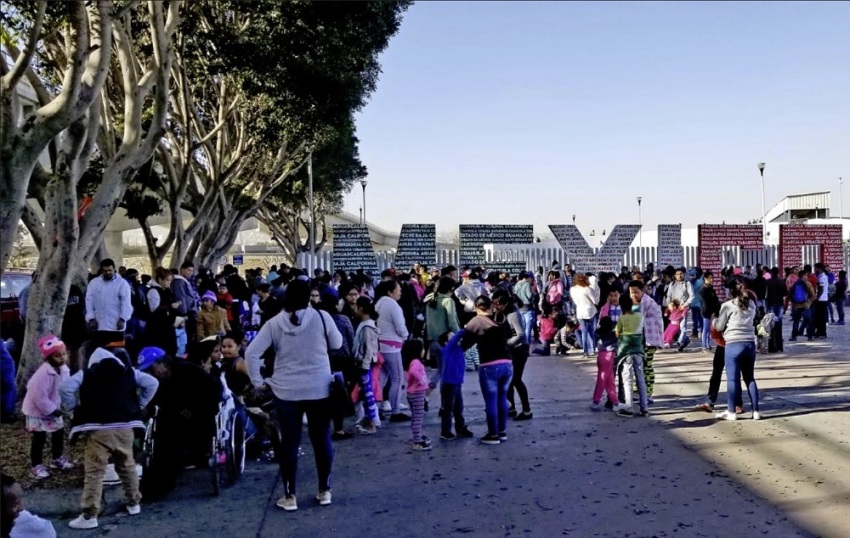Judge blocks Trump admin. rule requiring Central Americans to first seek asylum in countries they enter

A federal judge appointed by President Donald Trump struck down the administration’s asylum regulation that required Central Americans to first seek asylum in other countries they traveled through before seeking asylum in the United States.
U.S. District Judge Timothy J. Kelly on Tuesday night struck down the rule enacted last summer that bars immigrants from applying for asylum in the U.S. if they did not first apply for asylum in a country they passed through before reaching the U.S. southern border.
The order halts the implementation of the policy and denied the government’s request to stay the order pending the government’s likely appeal of his decision.
Kelly, who was appointed to the U.S. District Court for the District of Columbia in 2017 and is among 200 other federal judges appointed by the Trump administration, sided with immigration advocacy nonprofits.
The plaintiffs, who include immigration advocacy groups and nine asylum seekers, claimed that the regulation published by the Department of Homeland Security and the Justice Department, known as the “third-country asylum” rule, violated the Immigration and Nationality Act as well as the Trafficking Victims Protection Reauthorization Act.
The rule essentially requires asylum seekers from El Salvador, Guatemala, Honduras, and other Central and South American countries to go through the asylum process in other countries before applying for asylum in the U.S.
The plaintiffs contend that the ruling was “arbitrary and capricious” and issued without notice-and-comment procedures.” They further argued that the policy has virtually halted asylums at the southern border for the last year.
Kelly called the rule “unlawfully promulgated” and accused the Trump administration of not following the proper protocols outlined in the Administrative Procedure Act as it did not allow enough time for a public comment period.
“The APA generally requires substantive rules to be promulgated through notice-and-comment rulemaking,” Kelly wrote in his opinion. "These procedures are not a mere formality.”
The federal government argued that exceptions to the APA requirements applied to the rule.
One of them is called the “good cause” exception, where an agency does not need to provide notice and an opportunity to comment “when the agency for good cause finds … that notice and public procedure thereon are impracticable, unnecessary, or contrary to the public interest.”
According to the judge’s ruling, the administration also argued that through the “foreign affairs function” exception, the normal notice-and-comment requirements don’t apply “to the extent that there is involved . . . a military or foreign affairs function of the United States.”
“Defendants argue that notice-and-comment rulemaking would have been impracticable and contrary to the public interest because that process would have led to a surge of asylum seekers at the southern border of the United States,” the order explains.
“The Departments asserted upon the Rule’s promulgation that if it were published for notice and comment before becoming effective, smugglers might communicate its impending effects to potential asylum seekers, thus creating a ‘“risk of a surge in migrants hoping to enter the country’ beforehand.”
Kelly also said in his decision that the administration failed to “document any immediate surge that has ever occurred during a temporary pause in an announced policy.”
Because of border restrictions enacted by the Trump administration in response to the coronavirus pandemic, the order might have little impact in the near term. However, refugee advocates are calling the court’s decision a “victory.”
“The court determined what we have all known since this rule was created — that it is illegal, it violates everything this country stands for, and it must be thrown out,” Manoj Govindaiah, litigation director at Refugee and Immigrant Center for Education and Legal Services, a plaintiff in the case, said in a statement.
“The court's decisive action is a victory to all asylum seekers and human rights protectors everywhere.”
Hardy Vieux, senior vice president at Human Rights First, another plaintiff, said in a statement that the ruling prevents the administration from doing an “end-run around the law.”
“In the United States of America, we follow the rule of law, even when it benefits asylum-seekers demonized by this administration,” Vieux asserted.
Matthew Soerens, a national coordinator of the Evangelical Immigration Table and director of U.S. church mobilization for World Relief, has previously argued that countries like Mexico have “almost no capacity to adjudicate asylum requests.”
“People trying desperately to go through our complex legal processes to request protection simply can't win, because we keep changing the rules,” Soerens tweeted last September.
The Supreme Court ruled last September to temporarily allow enforcement of the asylum rule, lifting an injunction ordered by a federal judge in California. Attorney Gen. William Barr said at the time that the new rule will reduce the “burdens associated with apprehending and processing hundreds of thousands of aliens along the southern border.”
In January 2019, Trump declared a national emergency in response to what many described as a “border security and humanitarian crisis.”
The Trump administration has also issued other asylum protocols, including a policy that requires asylum seekers to wait on the Mexico side of the border until their asylum claims can be adjudicated.
Follow Samuel Smith on Twitter: @IamSamSmith
or Facebook: SamuelSmithCP



























